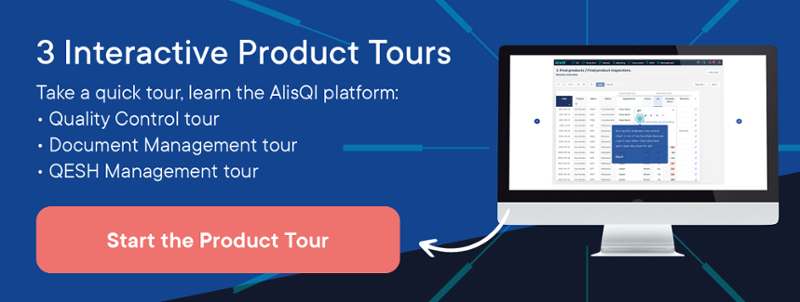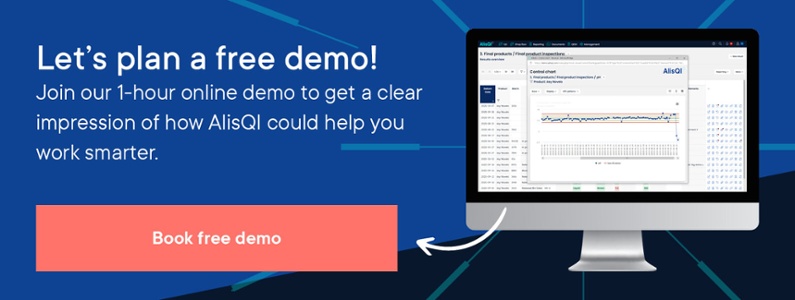Solvers help you monitor quality, apply SPC, manage equipment, and ensure traceability.

Implement and master QMS even without IT involvement
A Quality Management System (QMS) is a great asset to any manufacturing organization. It acts as a framework, safeguarding quality and promoting a focus on improvement. But what if your organization doesn’t use a QMS and has limited IT resources to support implementing one? Should you postpone deployment or – even worse – decide against it?
In the era of omnipresence and hyperconnectivity, quality management must belong to everyone. We’re here to help quality teams implement AlisQI – a user-friendly QMS that’s flexible, smart, and can be managed easily without input from IT.
Digitization can lead to delays
The Digital Revolution is far from over. And, while we welcome the smarter ways of doing things, we rarely consider what these changes mean for the IT department. More often than not, IT is fully booked. This applies to mid-size as well as Fortune500 companies. So, when new requests come in – say for implementing a Quality Management System – the quality/operations teams are left waiting.
Despite the clear advantages of a QMS, implementation projects can be delayed if organizations choose a vendor where IT is heavily involved. The good news is – not all vendors are alike.
AlisQI: the DIY approach to implementing a QMS
These days you see the DIY (‘do it yourself’) acronym everywhere. However, when it comes to QMS implementation, you probably imagine complex, time-consuming tasks. What if that wasn’t the case?
AlisQI is a Quality Management System that combines Quality Control, SPC, a document management system, and QESH Management into a single platform. This means there is no need to set up and integrate separate systems. Organizations will need to implement one single platform that was designed with user-friendliness in mind. Unlike other software projects that seem to take away the expertise from the end-user, AlisQI empowers quality teams to take even the first steps themselves.
One manufacturing company that took the DIY path is Delamine, a leading chemicals producer in the Netherlands. AlisQI was implemented by the Quality Assurance Manager together with a colleague – neither of which has an IT background. Although ease of use was among the main pre-set requirements, they were delighted at just how easy this turned to be in practice.
After implementation, managing the system has also been done without input from IT.
“The department representatives each set up their own part of the system,” the QA Manager said. “This makes it very clear to the users because they actually recognize their own processes.”
Delamine is only one of the manufacturers that praised AlisQI for its user-friendliness. Based on the very positive reviews left by our customers, review platform Capterra awarded AlisQI the ”Best ease of use” badge.
The advantages of taking matters into your own hands
We are applauded by IT managers for our approach to QMS implementation. But helping the IT department by saving them time and taking one thing off their to-do list is not the only advantage. Organizations can also enjoy these benefits:
1. Speedy deployment. We see customers going live with their first processes within days of the start of the project.
2. Lower costs. Large-scale consultancy projects can run into many hundreds of thousands of euros. In contrast, speedy deployment lowers the costs and reduces the risk of end-user disengagement.
3. Greater flexibility. The quality/operation teams are not dependent on the agenda of the IT department. Early and extensive involvement during the implementation builds confidence. End-users quickly learn how to manage and adapt the system.
Our No-code business model
AlisQI projects are straightforward to implement because our software was developed with the end-user in mind. The wider aim is omnipresence. The deeper the commitment of the end-user in the initial phase, the more engaged he or she will be with the system going forward. We see this as a strategic differentiator in our markets.
In our product development, we will focus on enabling end-user deployment wherever possible. Even for complex topics such as enabling Single Sign-On and system integrations we provide or will be providing user interfaces.
You can read more about our vision and how we facilitate QMS implementation in our whitepaper – AlisQI: No-code Quality Management.
Do you want to see our product in action and make sure that you can implement it yourself?



